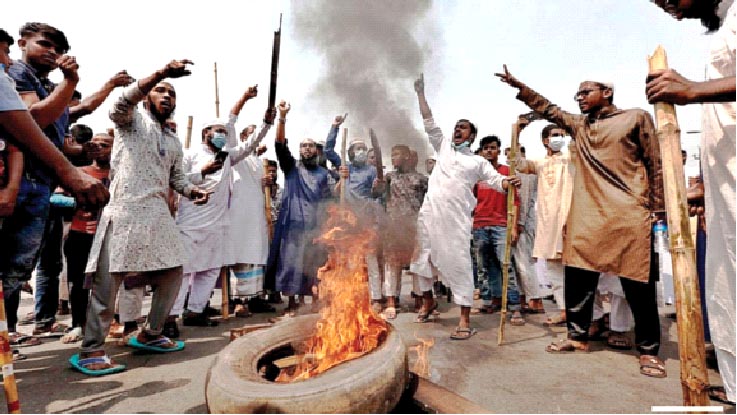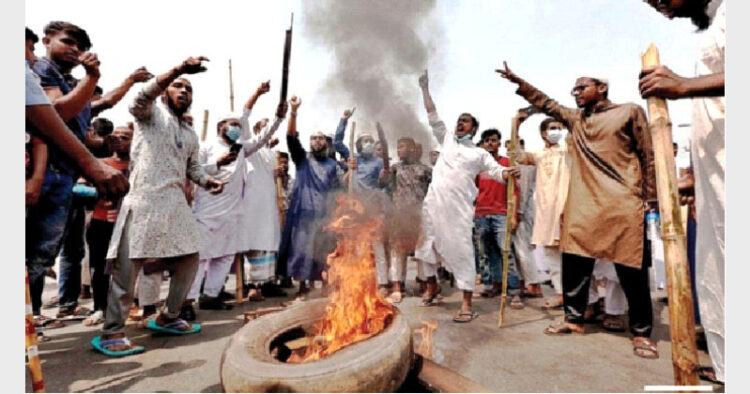Now this being the overall picture of Pakistan so far as the Hindus are concerned, I shall not be unjustified in stating that Hindus of Pakistan have to all intents and purposes been rendered “Stateless “ in their own houses. They have no other fault than that they profess Hindu religion. After anxious and prolonged struggle I have to come to the conclusion that Pakistan is no place for Hindus to live in and that their future is darkened by the ominous shadow of conversion or liquidation. The bulk of the upper class Hindus and politically conscious Scheduled Castes have left East Bengal. The Hindus who will continue to stay in that accursed province for that matter in Pakistan will, I am afraid, by gradual stages and in a planned manner be either converted to Islam or completely exterminated.’ – Jogendra Nath Mandal, Minister of Law and Labour, Government of Pakistan in his resignation letter addressed to the then PM Liaquat Ali Khan, October 9, 1950

As an annual ritual, the US State Department came out with the country reports on Human Rights Practices. Within no time, Left-liberals claiming to be independent flashed it as ‘US State Department Pulls up India’ invoking all kinds of identities. Around the same time, in neighbouring Bangladesh, a fundamentalist Islamic outfit, Hefazat-e-Islam, went on a rampage attacking Hindus. They were protesting against Prime Minister Modi’s visit to pay tribute to Sheikh Mujibur Rahman on his birth centenary. When French President Macron initiated his policies of controlling Islamic radicalism in France, again in Bangladesh, Hindus were attacked.
This persecution of Hindus is not limited to Bangladesh; Pakistan has witnessed similar atrocities since its creation. Forget about the partitioned areas; even in the remaining Bharat, Hindus in the name of Hindus face persecution and violence at the hands of Islamists and Missionaries. Ironically, if there is any resistance, the media reports it as ‘Hindutva Fascism’. From ‘Kashmir’ to Kerala, Hindus face various kinds of violence, but it is never treated as human rights violence of Hindus. In the Northeast, many Hindus following tribal faiths face discrimination. Their rights are trampled due to the Constitutional anomalies on the concept of ‘minority’. Still, they do not figure in any reports.
There are three fundamental problems in the human rights framework. Firstly, the majority-minority question is very complex and fluid, especially in Bharat. In the non-Hindu majority states like Jammu-Kashmir or Mizoram, whether the Hindus can avail themselves the minority rights are still being debated in the Supreme Court. The proponents of the federal structure conveniently consider them as part of the national majority. Secondly, in the national context, where Hindus can be considered as the majority, they are divided and treated on caste lines. So, Muslims’ attacks on Dalits, like what happened in Bhainsa of Telangana and Sarai-Kale-Khan of Delhi, are systematically whitewashed.
Even at the time of Partition, Hindus were attacked as Hindus (being non-believers in the Islamic country called Pakistan). Still, it was cleverly studied as upper-caste or lower-caste. The same case was with the Sikhs of West Pakistan, who were targeted as non-believers.
Lastly, the Western framework of Human Rights is more used as a political and diplomatic tool. In liberal-capitalist democracies, issues related to racial or gender-based discrimination are much more severe percentage-wise. Unfortunately, in the name of liberal thinking, whom they target is democracies like Bharat, which are more vibrant and responsive than these self-appointed gate-keepers. Whatever may be the preaching of Communists in Bharat, the Communist regimes, whether in Bharat or outside, are not known for their human rights record. Their blatant communal politics further worsen the situation in states like Kerala, where Hindus face a dual onslaught of Islamists and Communists.
All lives do matter. Undoubtedly, the lives of the downtrodden and minorities need better legal protection. The problem starts when the so-called minority with bullying tactics use electoral blackmailing and show-off their strength where they are in the minority and consider it their right to persecute minorities where they are in the majority. The resignation of Jogendra Nath Mandal is a testimony of this statement. In the South Asian context, we need to evolve our own civilisational understanding of inter-religious relations for the sake of genuine human rights. The acceptance and respect for all worships is the cardinal Hindu principle that ensures spiritual and religious democracy. The Binary of believers and non-believers is the root cause of most of these religion-based human rights violations. Instead of giving too much importance to these American or European reports meant for their foreign policy objectives, we should learn lessons from history to make human rights all-inclusive and comprehensive.
@PrafullaKetkar














Comments